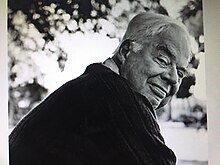Our website is made possible by displaying online advertisements to our visitors.
Please consider supporting us by disabling your ad blocker.
Richard Rorty
Richard Rorty | |
|---|---|
 | |
| Born | Richard McKay Rorty October 4, 1931 New York City, New York, U.S. |
| Died | June 8, 2007 (aged 75) Palo Alto, California, U.S. |
| Alma mater | |
| Era | 20th-century philosophy |
| Region | Western philosophy |
| School | Postanalytic philosophy[1] Neopragmatism[2] |
| Institutions | |
| Doctoral advisor | Paul Weiss |
| Doctoral students | Robert Brandom, Michael Williams |
Main interests | |
Notable ideas |
|
Richard McKay Rorty (October 4, 1931 – June 8, 2007) was an American philosopher and historian of ideas. Educated at the University of Chicago and Yale University, Rorty's academic career included appointments as the Stuart Professor of Philosophy at Princeton University, the Kenan Professor of Humanities at the University of Virginia, and as a professor of comparative literature at Stanford University. Among his most influential books are Philosophy and the Mirror of Nature (1979), Consequences of Pragmatism (1982), and Contingency, Irony, and Solidarity (1989).
Rorty rejected the long-held idea that correct internal representations of objects in the outside world are a necessary prerequisite for knowledge. Rorty argued instead that knowledge is an internal and linguistic affair; knowledge relates only to our own language.[4][5] Rorty argues that language is made up of vocabularies that are temporary and historical,[6] and concludes that "since vocabularies are made by human beings, so are truths".[7] The acceptance of the preceding arguments leads to what Rorty calls "ironism"; a state of mind where people are completely aware that their knowledge is dependent on their time and place in history, and are therefore somewhat detached from their own beliefs.[8] However, Rorty also argues that "a belief can still regulate action, can still be thought worth dying for, among people who are quite aware that this belief is caused by nothing deeper than contingent historical circumstance".[9]
- ^ Metaphilosophy – Internet Encyclopedia of Philosophy
- ^ Pragmatism – Internet Encyclopedia of Philosophy
- ^ Richard Rorty (1931—2007) – Internet Encyclopedia of Philosophy
- ^ Robert Brandom summarizes Rorty's anti-representationalism: "In a nutshell, this is how I think Rorty's critique of semantic representationalism goes: Normative relations are exclusively intravocabulary. Extravocabulary relations are exclusively causal. Representation purports to be both a normative relation, supporting assessments of correctness and incorrectness, and a relation between representings within a vocabulary and representeds outside of that vocabulary. Therefore, the representational model of the relation of vocabularies to their environment should be rejected." Brandom, Robert (October 11, 2000). Vocabularies of Pragmatism: Synthesizing Naturalism and Historicism. (In: Rorty and His Critics). Malden, Mass. p. 160. ISBN 0-631-20981-6. OCLC 43109795.
{{cite book}}: CS1 maint: location missing publisher (link) - ^ Rorty distinguished between knowledge-that and knowledge-how; only language users can have knowledge-that (epistemically valid knowledge) while all life forms, including bacteria and virus, can have "knowledge-how" (know-how). Rorty, Richard (October 11, 2000). Response to Barry Allen. (In: Rorty and His Critics). Malden, Mass. pp. 238–239. ISBN 0-631-20981-6. OCLC 43109795.
{{cite book}}: CS1 maint: location missing publisher (link) - ^ Rorty, Richard (1982). Consequences of Pragmatism: Essays, 1972-1980. Minneapolis. p. 158. ISBN 0-8166-1064-9. OCLC 8222790.
{{cite book}}: CS1 maint: location missing publisher (link) - ^ Rorty, Richard (1989). Contingency, Irony, and Solidarity. Cambridge. pp. 6, 21. ISBN 0-521-35381-5. OCLC 18290785.
The world can, once we have programmed ourselves with a language, cause us to hold beliefs. But it cannot propose a language for us to speak. Only other human beings can do that. [...] [S]ince truth is a property of sentences, since sentences are dependent for their existence upon vocabularies, and since vocabularies are made by human beings, so are truths.
{{cite book}}: CS1 maint: location missing publisher (link) - ^ "The ironist spends her time worrying about the possibility that she has been initiated into the wrong tribe, taught to play the wrong language game. She worries that the process of socialization which turned her into a human being by giving her a language may have given her the wrong language, and so turned her into the wrong kind of human being. But she cannot give a criterion of wrongness. So, the more she is driven to articulate her situation in philosophical terms, the more she reminds herself of her rootlessness by constantly using terms like Weltanschauung, 'perspective', dialectic, conceptual framework, 'historical epoch', language game, 'redescription', 'vocabulary' and 'irony'." Rorty, Richard (1989). Contingency, Irony, and Solidarity. Cambridge. p. 75. ISBN 0-521-35381-5. OCLC 18290785.
{{cite book}}: CS1 maint: location missing publisher (link) - ^ Rorty, Richard (1989). Contingency, Irony, and Solidarity. Cambridge. p. 189. ISBN 0-521-35381-5. OCLC 18290785.
{{cite book}}: CS1 maint: location missing publisher (link)
Previous Page Next Page


